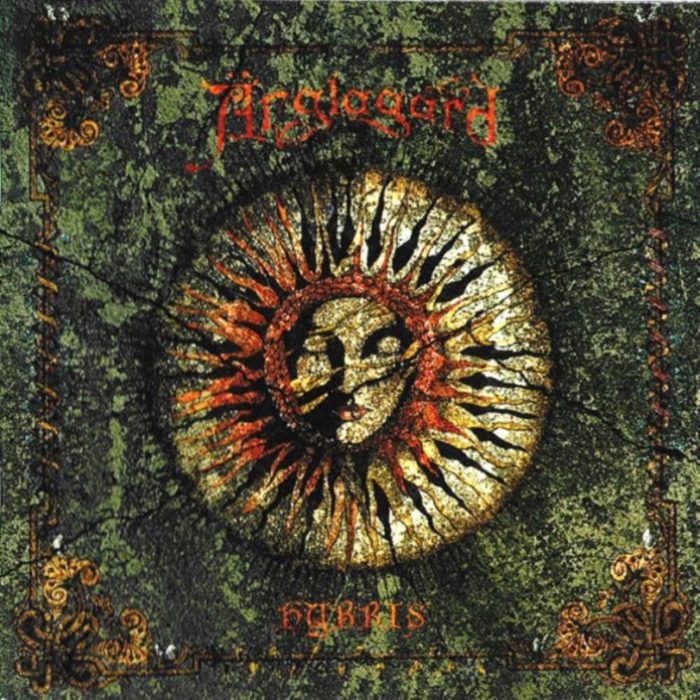Those of you who despair about the lack of good contemporary metal music take notice –- it could be worse. One striking example is progressive rock which, after five years of unprecedented creative activity in the early 1970s, blew all of its fuses and left only pale imitations of a glorious past in its wake.
Many of the original bands kept going, but could never reach the heights of their early days. Neither could the so-called neo-progressive movement of the early 1980s restore a sense of dignity to the genre. They only managed to copy the stylistic tropes established during the heydays of the early 1970s, especially those of Genesis, without any noticeable insight into what made these bands great in the first place. Since then, only a handful of releases within the progressive rock field have been able to even approach the grandeur of the music produced during the heydays of the genre. One of those exceptional record is the Swedish band Änglagård’s debut album Hybris.
Like the neo-progressive groups, Änglagård looks back towards the music of the 1970s in search for inspiration and musical vocabulary. Their style and sound can be described as a tasteful blending of classic English bands like Genesis, King Crimson and Yes, coupled with more obscure sources such as Cathedral (not that Cathedral, but the late 1970s North American progressive rock group) and Shylock. Despite their faithful replication of their influences, Änglagård managed to find a voice of their own thanks to the subtle but distinct Scandinavian character of the music. This is not as simple as obvious references to folk music or employment of traditional instruments, but is more a question of the band giving their songs a sense of melancholy and darkness that resonates with a Nordic atmosphere.
What ultimately separates Hybris from the mediocrity of most post-1974 progressive rock is that the band clearly understand the importance of writing songs that traverse beyond the mundanity of standard rock music. Whereas neo-progressive groups like Marillion excelled in aping every one of Genesis’ stylistic idiosyncrasies, they were not capable or interested in writing the kind of narrative-driven, long-form compositions that set progressive rock bands like Genesis, King Crimson and Yes apart from the herd. Änglagård on the other hand presents us with four long, winding composition that invite the listener to contemplate the telling of a story in musical language. Each track traverses through several sections and layers that evokes a variety of different, sometimes contrasting sensations. Moreover, the album is chock-full of delightful and hummable melodies that never overstay their welcome, and this aids the listener in navigating throughout the compositions.
A few minor issues arise after repeated listening. To begin with, some of the musical borrowings could almost be classified as robbery, although it might just be that Änglagård wishes to give tribute to their influences. Second, the vocals are a bit twee, but it never becomes an issue since they are few and far between. And third, there are a couple of transitions between song sections that do not quite work 100%. However, these little flaws somehow add to the charm of the record so it’s not really an issue at all.
There are good reasons why Hybris is regarded as one of few modern progressive rock classics. The album is performed with spirit and has a strong character that defies novelty. It is also a very enjoyable and memorable collection of songs that manage to keep interest over time without going over the top in terms of pomposity or instrumental complexity. Hybris might well be what Sammath’s Godless Arrogance is to underground metal: a flickering of light in a sea of darkness.
Tags: anglagard, hybris, neo-progressive, progressive rock, review, Sweden



While this music is made of progressive notes and stylings, it is clearly disciplined into riffs and functions in a very metal fashion. It was rarely achieved in the 70s, when mentality of musicians was still dominated by amorphousness of rock.
Atheists are faggots because this album is GOD. Though Epilog is better.
what do you guys think of this band:
Deathwish – At The Edge Of Damnation 1987
https://www.youtube.com/watch?v=IgNYJlpm530&t=322s
I think the wish should be granted.
A great recommendation. Thank you!
Irrelevant recommendation. Nice review though of Hybris. I like ’em all, but Viljans Öga stands as my personal favourite. Agreed that few contemporary prog bands have reached Änglagård’s heights. I’ve a soft spot for Il Bacio Della Medusa; how about some reviews of either classic (godly, i.e. Il Balletto di Bronzo or Museo Rosenbach) or otherwise worthy contemporary Italian prog? Van der Graaf and In The Wood’s Omnio also good candidates. [Hey, I like metal too].
Balletto di Bronzo and Museo Rosenbach are classics. Might be a good idea to review them!
I keep scrolling past this & reading it as analgard.
Just thought I should pass that important information on.
What are your thoughts on Amon Düül II's “Yeti”?